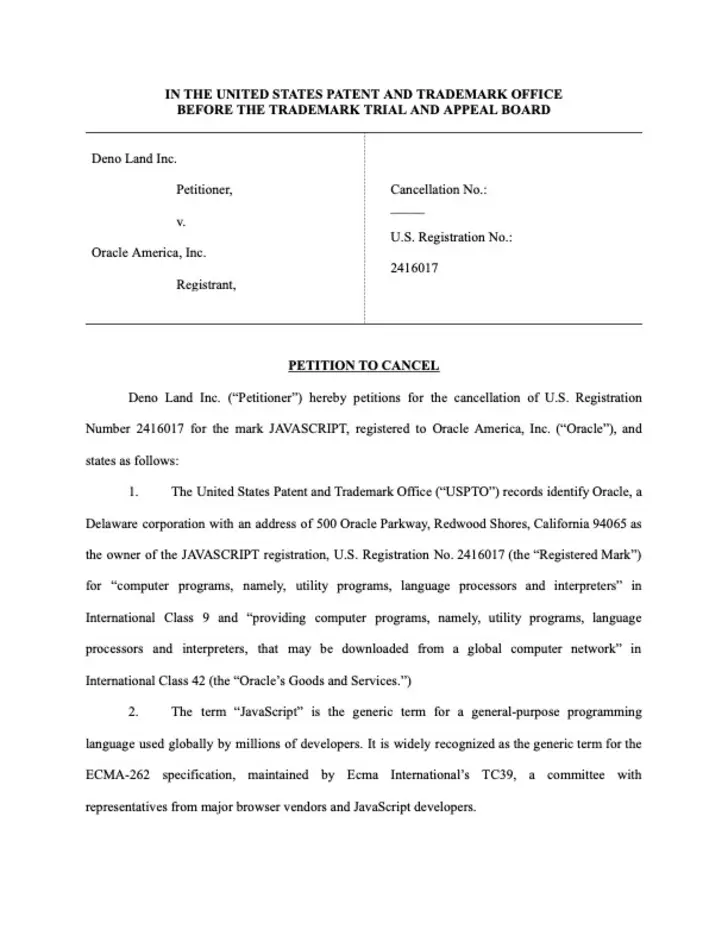I’ve been following the JavaScript trademark saga closely, and let me tell you - it’s more fascinating than your typical tech legal battle.
Ryan Dahl (creator of Node.js) and Brendan Eich (creator of JavaScript itself) are taking on Oracle over a trademark that’s become as generic as “escalator” or “thermos.”
As someone who’s watched the open source community evolve, this feels like a pivotal moment.
Oracle, it’s time to free JavaScript.

The Corporate Calculus at Oracle
Having worked with large tech companies, I know their playbook well. Oracle faces a decision that’s more complex than it appears on the surface. While they could fight the petition, release the trademark voluntarily, negotiate some middle ground, or ignore it completely, the real calculation goes deeper than just legal strategy.
Oracle’s history with developer communities tells us everything we need to know about how this might play out. When they acquired Sun Microsystems, they inherited not just JavaScript’s trademark, but also control of Java, MySQL, and OpenOffice. Their handling of these properties followed a pattern: initially aggressive protection of their rights, followed by community backlash, and eventually a more nuanced approach.
The Hudson/Jenkins split particularly stands out in my mind. When Oracle asserted trademark rights over Hudson (a continuous integration server), the community simply forked the project and renamed it Jenkins. Today, Jenkins dominates the space while Hudson is barely remembered. Oracle learned an expensive lesson: in open source, community goodwill often matters more than legal rights.
Why A Fight Would Be Pointless
I spent some time digging through Oracle’s recent SEC filings and public statements, and something jumped out at me - JavaScript isn’t mentioned once in their business risks or strategic assets. For a company that meticulously documents every potential revenue stream and competitive advantage, this silence speaks volumes.
The trademark’s value to Oracle is effectively zero. They can’t monetize it through licensing - the term has become too generic. Their own products barely use it. Even their JavaScript Extension Toolkit (JET) and GraalVM documentation seem to minimize the term “JavaScript” in favor of “JS” or technical specifications.
This reminds me of what happened with the term “UNIX” in the 1990s. AT&T once vigorously defended this trademark, but as the term became generic through widespread use, their control became increasingly theoretical rather than practical. The same thing has happened with JavaScript - it’s no longer a product name but a description of a technology.
The Most Likely Outcome
My experience with similar cases suggests a predictable pattern: Oracle will take 2-3 months to “review the situation,” then announce they’re releasing the trademark “for the benefit of the developer community.” They’ll frame it as a proactive decision rather than a response to legal pressure.
This approach makes perfect sense from a corporate perspective. The delay period gives their legal team time to confirm what they likely already know - that defending the trademark would be expensive and ultimately futile. It also allows them to control the narrative, potentially even earning some goodwill from the developer community.
The timing might seem slow to outsiders, but large corporations move deliberately in these situations. Legal departments need to review implications, PR teams need to craft messaging, and management needs to sign off. I’ve seen this play out before with other tech giants - when they know they’re going to concede, they still take their time to do it on their terms.
The Uncomfortable Questions
The really interesting part of this situation isn’t the legal battle - it’s the uncomfortable questions it raises about intellectual property in the modern tech world. How did we end up in a situation where the world’s most popular programming language has its name controlled by a company that had nothing to do with its creation or evolution?
This trademark dispute symbolizes a larger disconnect between traditional corporate IP law and the reality of modern software development. The JavaScript ecosystem, worth billions in economic activity, has thrived despite (or perhaps because of) the lack of corporate control over its name and direction.
A New Chapter for Open Source
What excites me most about this situation is what comes next. The JavaScript community has operated under an awkward linguistic constraint for years - conferences called “JSConf,” specifications referencing “ECMAScript,” products using “JS” instead of the full name. Removing these constraints might seem trivial, but it represents another step in the maturation of open source.
Remember when “open source” itself was a radical concept? When companies viewed giving away source code as bizarre and dangerous? We’ve come so far from those days, and yet vestiges of the old proprietary mindset still linger in things like the JavaScript trademark.
This case isn’t just about a name - it’s about acknowledging that some technologies transcend traditional corporate ownership. JavaScript, like HTML and HTTP, has become part of the commons - a shared resource that benefits everyone by being free and open.